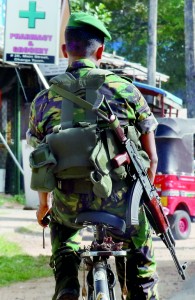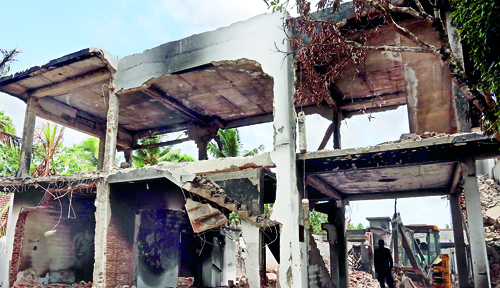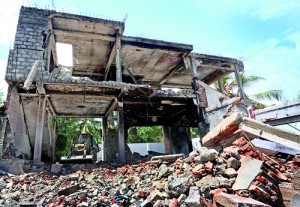News
After the fury, only fear and tears left
It’s the time of the year when night turns into day for Muslims in this tiny village of Dharga Town, nestled on the banks of the Bentota River and surrounded by Sinhala villages. However, this time, it was not to be.

Armed STF patrolling the streets
During the holy month of Ramadan, after they break-fast at sunset, the town comes alive. Shops remain open till the wee hours of the morning. Carts and glass covered counters sell a variety of finger food and drinks – cutlets, samosas, patties, stuffed Godamba and rotty, faluda and fruit juices among them. Even textile shops with dhotis (sarongs), sarees and salwar kamiz of different hues draw crowds. Devotees who go for Tharaveeh prayers in the night later throng the streets and a carnival atmosphere of sorts takes over. This is till Sahar – ahead of dawn when Muslims partake in a meal to begin the day long fast.
This time, however, the only people on the streets are armed commandos of the Police Special Task Force (STF). Just after prayers end at 9.30 p.m. shops wind down, devotees are back in their homes and their doors close.
The scars of the ethnic violence – destroyed homes, damaged buildings and burnt out shops still remain testimony to the incidents here, in Aluthgama and Beruwala. Some 700 hundred soldiers are engaged in a battle to re-build and thus erase bad memories.Truckloads of debris are moved out as

Mohamed Riyaz
soldiers plaster walls, build roofs or simply stand guard.
But a more telling saga of the violence that erupted on June 15 is only unfolding now. It is not just the Muslims who have suffered by the wanton acts of a tiny group of their Sinhala brethren. A large number of Sinhala youth have lost their jobs and thus their means of livelihood.
The tale of 36 year old Samanthi (real name withheld at her request), a mother of three children, symbolises the sad tale of many of her Sinhala female colleagues. She is from Aviththawa, some 22 miles away near Matugama and was an employee of a garment factory at Military Road for eight years
She obtained a loan from a welfare society but her house has only been partially built. “Our own Sinhala people came in mobs, attacked the factory and the residence of the owner. They set it on fire. I am now left jobless and don’t know how to pay the loan, look after my children. My future looks bleak. I have only found temporary employment,” she told the Sunday Times. Tears flowed from her eyes as she related the incident which occurred around 5 p.m. on June 15, sometime after the Bodu Bala Sena meeting ended in Aluthgama.
At what was once the factory cum residence we saw broken, burnt out parts of juki sewing machines strewn around. Mohamed Riyaz, whose success in business was a rag to riches story, says four of his machines, each worth Rs 2.5 million were designed to turn out collars for T-shirts. “All that remains from my Peugeot car and a Hi-ace van are burnt metal. I had stored a stock lot of garments which did not move in Pettah shops. That was worth three million rupees. They also went up in smoke,” Mr. Riyaz adds. He estimates a loss of around Rs 100 million.
He said he employed 50 Sinhala and 10 Muslim girls in the factory. His nephew ran a garment factory next door. Like at his factory, all the machines were destroyed.
There was no roof in the building and only blackened walls remained. Broken tiles lay all over the ground. In the pantry, we found, utensils used for staff meals and refreshments given free of charge have been destroyed. “There are broken kettles, microwave ovens, refrigerators and washing machines. I did not insure them. I will not re-start the factory here again,” said Mr.Riyaz. He said the employee age group in his factory was between 30 and 40.

All that remains of two factories that gave employment to residents in the area. Pix by M.A. Pushpa Kumara
Her employer, Samanthi said, granted them loans. Her husband was a labourer. “The money he earned was not enough to buy day to day essentials. I was the main breadwinner. I was able to spend for my children’s education,” she said. She lamented that she did not know how to find Rs 5,000 to pay the monthly loan installment for the welfare society for the loan for her partly built house.
“It was common practice among us to have a ‘Seettu’ system. When it came to my turn, I would buy electrical appliances for our house,” she said. The system entails a group pooling a sum of money and permitting one contributor to collect it at a time. “I earned a salary of Rs 18,000 but now I don’t know from where my next meal would come until I find a proper job,” she said. “My worries are of the uncertain future of my three school-going children, completing my partially built house and the loan I took,” Samanthi says.
A colleague of Samanthi is Niranjala (her name too withheld upon request) who is 45 years.
Niranjala (45), a mother of two, lived in a home near Military Road. “I was happy at this factory because the working hours were flexible. I took my children to school and reported to work,” she said. “There was no ill feeling among Sinhalese and Muslim workers. We lived and worked happily. On some occasions we even took food home from the factory,” she added.
What was another apparel factory at Adhikrigoda, barely a kilometre away, piles of gutted sewing machines, cutting machines and partially burnt out garments lay in a pile. More Sinhala female workers were employed here. The factory also made women’s handbags and children’s clothing.
 Deepika Samanthi (28) worked in a factory which employed 400 workers and was located in Ittepana, some 14 kilometres away near Welipenna. They were all Sinhala workers though the factory was owned by a Muslim. “Mobs came and ordered us to get out. We pleaded with them not to harm the factory since that was our livelihood. They did not pay heed,” she said. She said it was only the next morning she saw the extent of the damage. “I saw burnt out machines, broken window panes and a part of the factory building burnt,” she added.
Deepika Samanthi (28) worked in a factory which employed 400 workers and was located in Ittepana, some 14 kilometres away near Welipenna. They were all Sinhala workers though the factory was owned by a Muslim. “Mobs came and ordered us to get out. We pleaded with them not to harm the factory since that was our livelihood. They did not pay heed,” she said. She said it was only the next morning she saw the extent of the damage. “I saw burnt out machines, broken window panes and a part of the factory building burnt,” she added.
The Divisional Secretary for Beruwala, U.D. Jayaratne who heads a move to ensure the return of complete peace says different committees are at work. Leaders of the Sinhala, Muslim communities, religious leaders of both sides, Police and Army officials are engaged in regular meetings to review the situation and ensure peace is not disturbed.

